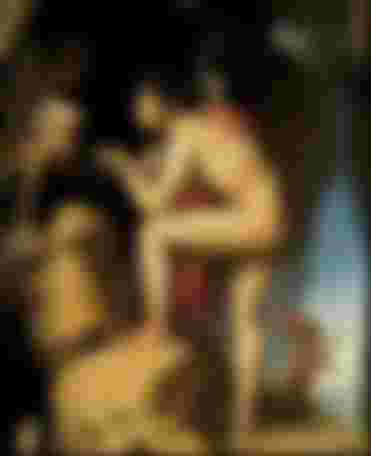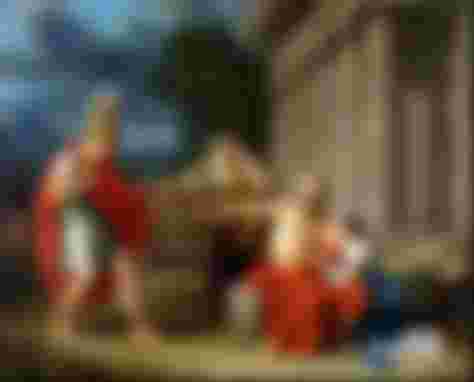The son of the king of Thebes, Laius and queen Jocasta, the unfortunate king of Thebes, who in ignorance killed his father and married his mother. The gods quickly proclaimed that terrible sin and sentenced Oedipus to an evil fate: his mother hung herself on a high beam in despair, leaving him sorrow and remorse. Oedipus still ruled over You, but he was persecuted by Erinyes. When he died in one battle, the Thebans buried him with the greatest honors. This short and sad story was later supplemented with new details that explain the causes of Oedipus' accident.
Oedipus was cursed before he was even born. His father, King Lai, abused Pelops' hospitality and cursed himself either to lose his children or to be killed by his own son. Although he was prophesied in Delphi that he would lose his life at the hands of his son and that Thebes would prosper only if he died without offspring, Lai, drunk or overwhelmed with lust, nevertheless approached his wife Jocasta. When his son was born, he stabbed and pierced the child's ankles, and then gave it to a shepherd to leave him on Mount Kitheron. This good man did not obey the king, but handed the little one over to the herdsmen of the Corinthian king Polybius. Others say that the Corinthian shepherds found Oedipus themselves and took him to King Polybus. Since he had no children, the king accepted the child and raised him and his wife Merop as their own son.
At Polybius' court, Oedipus grew into a strong but impulsive young man. His early youth flowed in undisturbed happiness, until the day when a Corinthian, in drunkenness or envy, told him that he was not the king's son, but at will. Those words disturbed Oedipus. He immediately asked Polybus and Meropa about his origin and, as their answers did not satisfy him, he went to Delphi to learn the truth from Apollo's prophecy. Instead of answering the question, he was told that he would kill his father and marry his mother. Convinced that Polybius and Merope were his parents, he avoided Corinth and the house where he grew up. Meanwhile, Lai, when the signs warned that his son would kill him, went to Delphi to find out what happened to the little boy who was left on Kitheron. In Phocis, in the gorge where the roads from Daulida, Thebes and Delphi intersect, there was a tragic meeting of father and son. Since the passage was narrow, Laius' messenger Polyphon or Polypet ordered Oedipus to get out of the way. The young man blazed with anger and hit the messenger, but as he passed the car, Lai whipped him. Instead of retaliating in the same way, Oedipus killed the old man with a strong blow of a stick. Filled with rage, the young man then killed Lai's companions, but one of them escaped death and returned to Thebes.
Others say that Oedipus met Laius before he arrived in Delphi and learned from the prophecy that he would kill his father and marry his mother. Since he had stained his hands with Blood's murder, he knew that the prophecy would not give him an answer, and so he returned to Corinth. Only later, in Delphi, did he learn of the fate that awaited him.
After Lai's murder, Jocasta's brother Creon took power in You. Even during Lai's life, the city was threatened by the Sphinx, a winged monster with the lion's body and the head of a girl, sent by Hera because of Chrysippus' abduction or Ares to take revenge on the Thebans for killing his son Cadmus. That monster was staying on a rock near You and asked passers-by to answer her question: "Which creature goes on four legs in the morning, on two legs at noon, and on three legs in the evening?" Anyone who did not solve the riddle was killed by the Sphinx immediately. As the number of victims increased day by day, the Thebans used to gather in the town square every day to find the answer to the Sphinx's question. All their efforts were unsuccessful, and in the meantime, the monster devoured the king's son Hemon. Creon and the citizens of Thebes announced that whoever liberates the city from that evil will receive the royal authority and the hand of Laius' widow Jocasta. The gods wanted Oedipus to set Thebes free. He answered Sphinx's question that he would be a man, because at the dawn of his life he walked on four, at noon on two, and at dusk, like an old man with a stick, on three legs (picture below). After the riddle was solved, the Sphinx jumped off the rock, and Oedipus, as the liberator of the city, received the promised reward.

For a time, Oedipus ruled peacefully. Jocasta bore him four children - sons Eteocles and Polynicus and daughters Antigone and Ismen. Suddenly, plague and famine began to plague you. When Oedipus sent Creon to Delphi to ask the prophecy what caused those misfortunes, he received the answer that Thebes would be saved when the murderer of King Laius was punished. Oedipus demanded that the Thebans find that criminal and cursed him to be an exile and an unfortunate person until his death, so that no one would greet him and receive him into their home. That is how he pronounced the verdict on himself. On Creon's advice, the blind prophet Tiresias was brought in and Oedipus asked him who the murderer of King Laius was. The prophet initially refused to answer that question, but when the king attacked him with ugly words, Tiresias announced that Laius' killer was Oedipus himself. The king then accused him of colluding with Creon, who wanted to gain power, and declared the prophet's statement a fabrication. Now the blind Tiresias dealt an even more terrible blow to Oedipus: he told him that he was blind in his eyes, that he thought he was a newcomer, and he was born in Thebes, that he would soon find out that his children were both brother and father, , and that the rich will become a poor man who will wander blindly abroad. The old prophet's confidence was shaken by Oedipus, who began a long investigation: he questioned Creon about the circumstances of Laius 'death, Jocasti complained about Tiresias' and Creon's intrigues, and when she tried to calm him down with a story about a bandit attack on Laius and his child who was whispered ankles left on Kitheron, a terrible suspicion was born in Oedipus, and he called the only surviving witness to the death of the old king. His suspicions were shattered for a moment by the arrival of a messenger from Corinth, who brought the news that Polybius had died. At that moment, Oedipus believed that he was not the murderer of his father, but when the messenger called him to take power over Corinth and told him that Polybius and Meropa were not his parents, dark forebodings began to torment him again. Jocasta was the first to realize the terrible truth. After futile attempts to dissuade Oedipus from further questioning, she retired to the court and took her own life. Finally, the old shepherd of Laius appeared before Oedipus, who admitted that he did not leave the child on Kitheron, but that he handed it over to Polybus' men. Only then did everything become clear to Oedipus. In the greatest despair, he entered the court to find Jocasta. When he saw her hanging from the beam, he moaned in pain, untied the rope and lowered her lifeless body to the ground. With a golden needle, which he tore from her dress, he pierced his pupils so that they would not look at his sinful deeds. Blind and helpless, covered in bloody tears, he came out in front of the Thebans and demanded that he be expelled from the city as soon as possible.
It is not known who expelled Oedipus from You and when it happened. Some say that Oedipus' sons, in order to cover up the shame, imprisoned their father in the palace and took away his royal authority, which is why Oedipus cursed them. It was said that Jocasta and Oedipus were still in Thebes when Eteocles and Polynicus killed each other in a duel, that Jocasta took her own life over the corpses of her sons, and that Creon expelled Oedipus.

Blind Oedipus was accompanied in exile by his daughter Antigone. All the cities refused hospitality to the unfortunate Theban king, until the day when the exiles arrived in Attica, on Colon, and took refuge in the holy grove of Eumenides. Oedipus then told his daughter that he was destined to die at that place and asked that King Theseus of Athens be brought to him (picture above), because he knew that the country that gave him refuge would be richly rewarded. In the meantime, Oedipus' younger daughter Ismena arrived at Colon, who informed her father and sister about the conflict between Eteocles and Polynicus. Since the prophecy in Delphi announced that the victory would be won by the one whose side Oedipus was on, the brothers asked for support from their father. Instead of helping them, Oedipus cursed his sons to kill each other in a duel.
The thunder indicated that the torments of the unfortunate Theban king were coming to an end. Oedipus said goodbye to Antigonus and Ismen, and then showed Theseus the place from which he would leave this world and which would protect Athens better than its ramparts in the future. Before Theseus' eyes the blind martyr disappeared; in the grove of Eumenides he was transformed into a hero.The fate of Oedipus was dealt with by Aeschylus in the tetralogy Lay, Oedipus, the Seven against You, the Sphinx. Two of Sophocles' tragedies about Oedipus have been preserved, namely King Oedipus (around 428 AD) and Oedipus on the Column (406 AD), as well as Seneca's tragedy King Oedipus. In fine arts, Oedipus is rarely depicted; only Oedipus with the Sphinx is represented on vases, and late antique frescoes from Hermopolis have been preserved, with scenes from the myth of Oedipus.
Literature:
• Dragoslav Srejović - Aleksandrina Cermanović-Kuzmanović, Recnik grčke i rimske mitologije, drugo izdanje, Beograd: Srpska književna zadruga, 1987


Thanks for sharing your knowledge